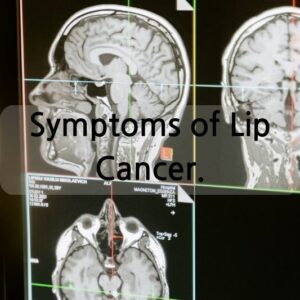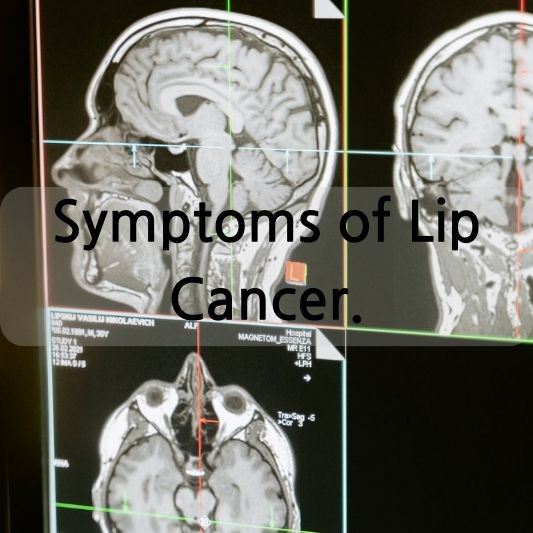Lip cancer is a serious condition that requires timely recognition and appropriate intervention. Understanding its symptoms is crucial for early detection and effective treatment.

Introduction to Lip Cancer
Lip cancer refers to the abnormal and malignant growth of cells on the lips. It can occur on the upper or lower lip and may manifest in various forms. Recognizing the symptoms of lip cancer is vital for prompt medical attention and intervention.
Understanding Lip Cancer Symptoms
Visible Signs
One of the primary symptoms of lip cancer is the presence of visible abnormalities on the lips. These may include persistent sores, lumps, or ulcers that do not heal within a reasonable timeframe. Additionally, any changes in the color or texture of the lips should be monitored closely.
Pain and Discomfort
Individuals with lip cancer may experience persistent pain or discomfort in the affected area. This discomfort may intensify during activities such as eating, speaking, or swallowing.
Changes in Sensation
Another common symptom of lip cancer involves alterations in sensation. This may include numbness, tingling, or a burning sensation on the lips or surrounding areas.
Risk Factors Associated with Lip Cancer
Several factors can increase the risk of developing lip cancer, including prolonged sun exposure, tobacco use, excessive alcohol consumption, and a history of precancerous lesions.
Importance of Early Detection
Early detection of lip cancer significantly improves treatment outcomes and prognosis. Regular self-examinations and routine dental check-ups can aid in the early identification of suspicious symptoms.
Seeking Medical Attention
Individuals experiencing any of the aforementioned symptoms should seek prompt medical attention from a healthcare professional. A thorough evaluation and proper diagnosis are essential for determining the appropriate course of action.
Diagnosis and Treatment Options
Biopsy
A biopsy is often performed to confirm the presence of lip cancer. During this procedure, a small tissue sample is extracted from the affected area and examined under a microscope for the presence of malignant cells.
Surgery
Surgical intervention may be necessary to remove the cancerous growth from the lips. The extent of surgery depends on the size and stage of the cancer.
Radiation Therapy
Radiation therapy utilizes high-energy rays to target and destroy cancer cells. It may be recommended as a primary treatment option or in conjunction with surgery or chemotherapy.
Chemotherapy
Chemotherapy involves the use of powerful medications to kill cancer cells or inhibit their growth. It may be administered orally or intravenously, depending on the individual’s condition.
Preventive Measures
To reduce the risk of developing lip cancer, individuals should practice sun safety measures, avoid tobacco products, limit alcohol consumption, and maintain a healthy lifestyle.
Support and Coping Strategies
Receiving a diagnosis of lip cancer can be emotionally challenging. It is essential for individuals to seek support from loved ones, healthcare professionals, and support groups to cope with the physical and emotional aspects of the condition.
Living with Lip Cancer: Lifestyle Adjustments
Adjusting to life with lip cancer may involve making lifestyle modifications, such as adapting dietary habits, practicing good oral hygiene, and prioritizing overall health and well-being.
Nutrition and Diet Recommendations
A balanced diet rich in fruits, vegetables, lean proteins, and whole grains can help support overall health and aid in the body’s recovery process during cancer treatment.
Emotional Well-being and Support Groups
Maintaining emotional well-being is crucial for individuals living with lip cancer. Engaging in activities that promote relaxation, seeking counseling services, and connecting with others facing similar challenges can provide invaluable support.
Maintaining Oral Health
Regular dental check-ups and proper oral hygiene practices are essential for individuals with lip cancer. Maintaining oral health can help prevent complications and ensure optimal treatment outcomes.
Educational Awareness and Advocacy
Raising awareness about lip cancer and advocating for early detection and treatment can help save lives. Education initiatives and community outreach efforts play a vital role in promoting understanding and prevention.
Conclusion
In conclusion, recognizing the symptoms of lip cancer and understanding the importance of early detection are critical for effective management and treatment. By staying vigilant and seeking timely medical attention, individuals can improve their chances of a successful outcome.
Frequently Asked Questions (FAQs)
What are the primary symptoms of lip cancer?
Persistent sores, lumps, or ulcers on the lips Pain or discomfort in the affected area Changes in sensation, such as numbness or tingling
What are the risk factors for developing lip cancer?
- Prolonged sun exposure
- Tobacco use
- Excessive alcohol consumption
- History of precancerous lesions
How is lip cancer diagnosed?
Through a biopsy to examine tissue samples under a microscope
What treatment options are available for lip cancer?
- Surgery
- Radiation therapy
- Chemotherapy
How can individuals reduce their risk of developing lip cancer?
- Practice sun safety measures
- Avoid tobacco products
- Limit alcohol consumption
- Maintain a healthy lifestyle
Learn more about Lip cancer Symptoms!
